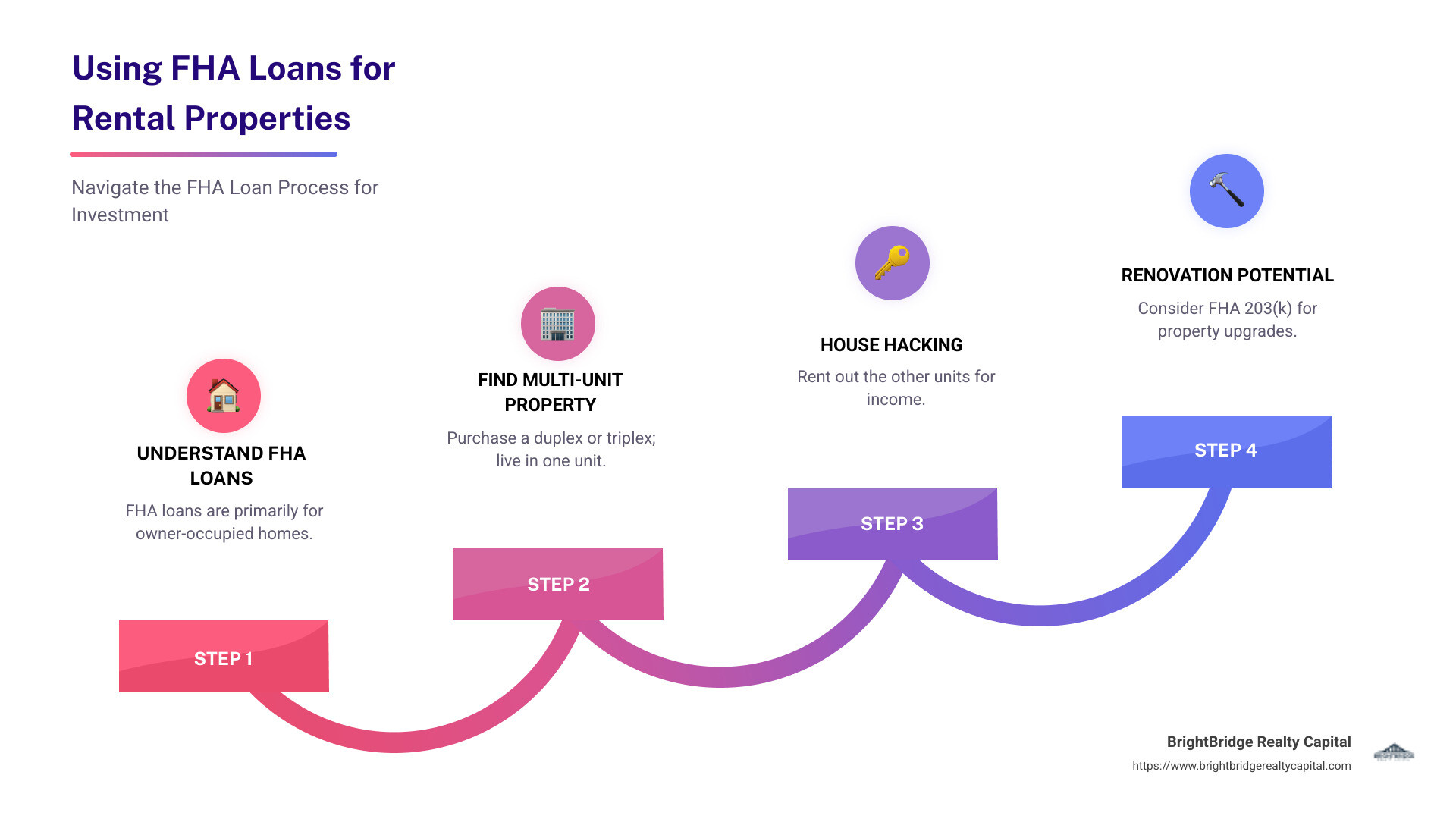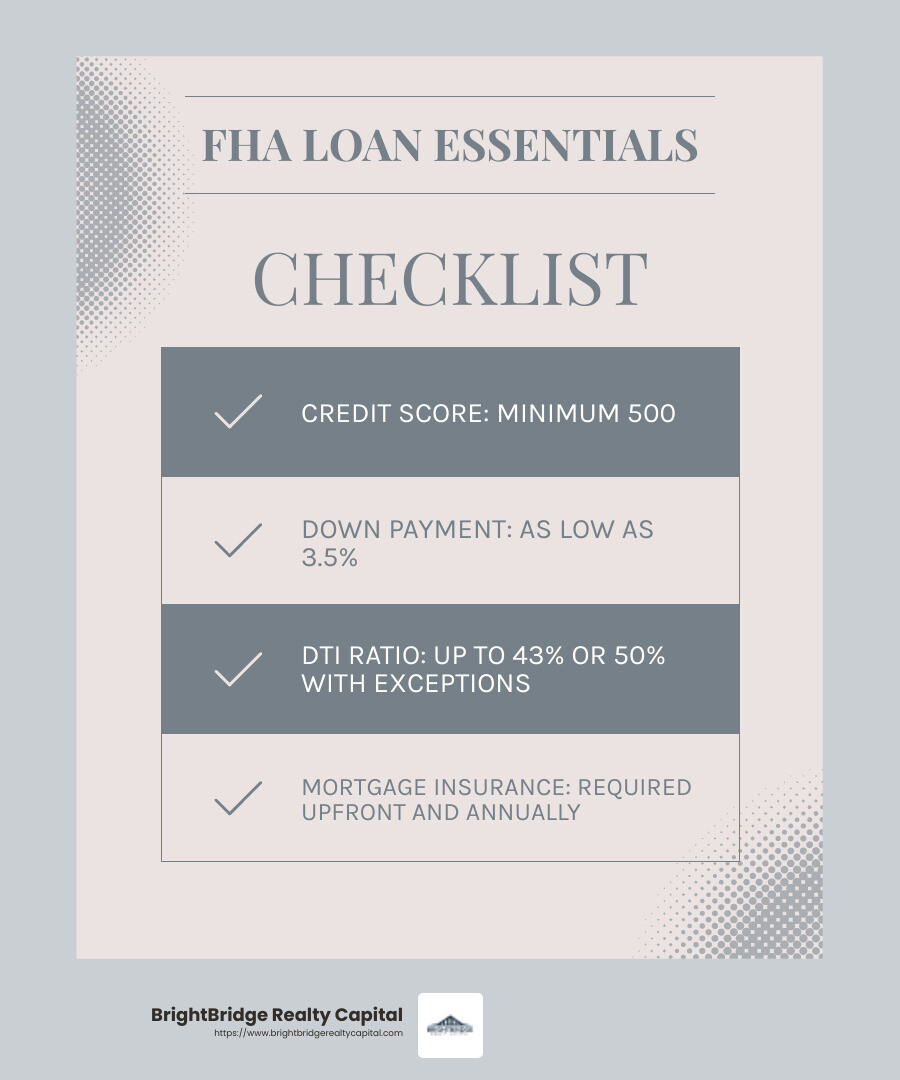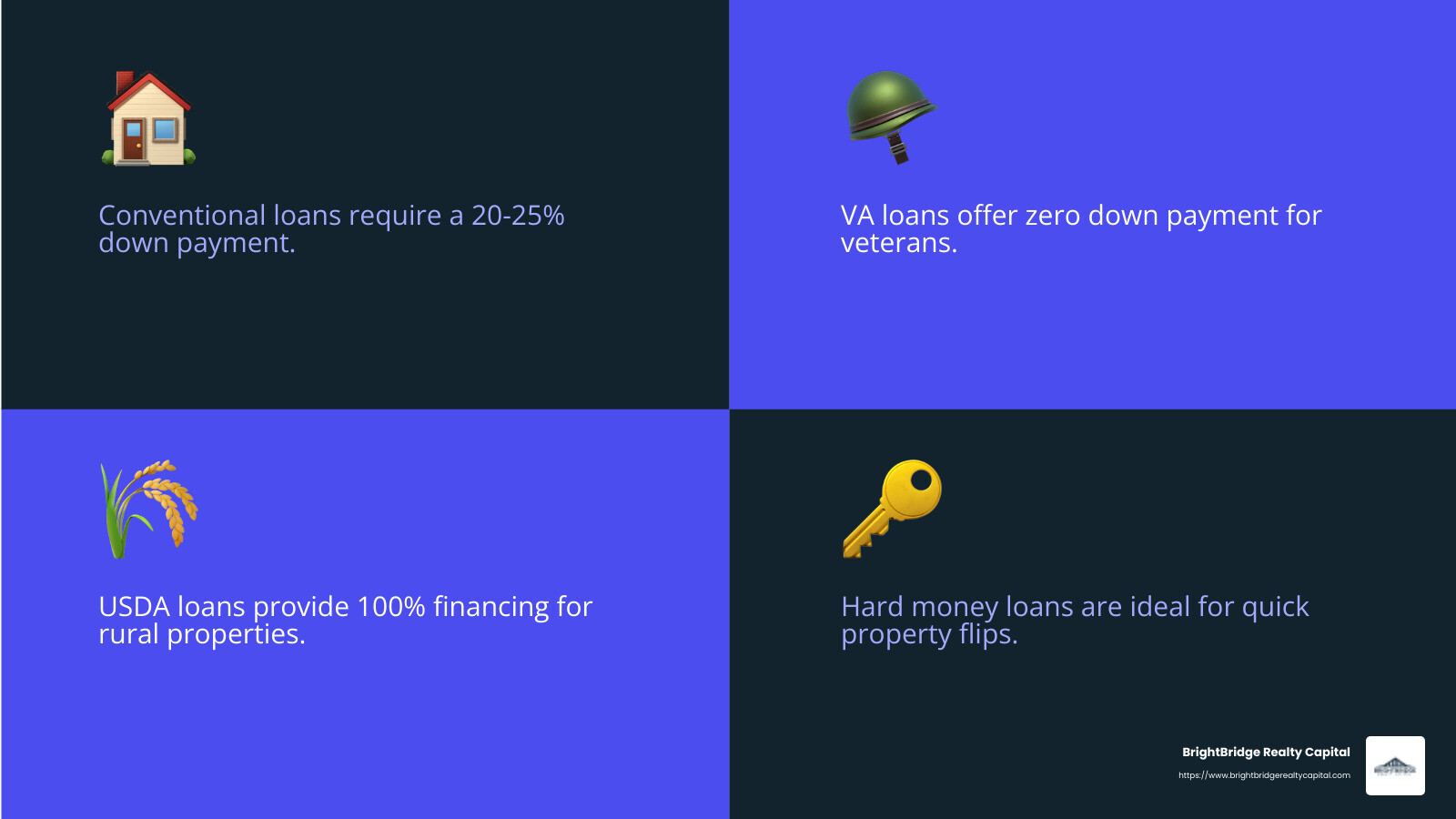Navigating FHA Loans: A Guide to Financing Rental Properties

FHA loan for rental property: When it comes to financing a rental property, using an FHA loan isn't straightforward. These loans are designed mainly for purchasing a primary residence, not directly funding an investment property. But there are some creative strategies investors can use to leverage FHA loans for their rental ventures.
- Primary Use: FHA loans are for primary residences.
- Exceptions: Buying multi-unit properties and renting out other units.
- Strategy: Live in one part, rent out others – often called "house hacking."
FHA loans are popular because they offer low down payment options and flexible credit requirements, making them a favorite among first-time homebuyers. However, smart investors also see opportunities within the confines of FHA's rules to turn these homes into income-generating properties.
Whether you're eyeing a multi-unit dwelling or thinking about renovating a starter home, understanding how these loans work can be a valuable asset in your real estate toolkit.

Fha loan for rental property terms you need:
- fha mortgage for investment property
- buying rental property with fha loan
- financing options for rental property
Understanding FHA Loans
FHA loans are a popular choice for many homebuyers, especially first-timers. They come with government backing, which means they're insured by the Federal Housing Administration. This backing makes lenders more willing to offer favorable terms, like lower down payments and lenient credit requirements.
FHA Loan Requirements
To qualify for an FHA loan, you'll need to meet several requirements:
Credit Score: A minimum score of 500 is required. However, a score of 580 or higher will get you the best terms, like a down payment as low as 3.5%.
Down Payment: As mentioned, the down payment can be as low as 3.5% for those with a credit score of 580 or above. If your score is between 500-579, you'll need to put down at least 10%.
Debt-to-Income Ratio: Typically, your debt-to-income (DTI) ratio should not exceed 43%. Exceptions can be made up to 50% with compensating factors.
Mortgage Insurance: FHA loans require both an upfront mortgage insurance premium (MIP) and annual premiums. These help protect lenders from losses if you default on the loan.
Owner-Occupied Properties
The primary requirement for an FHA loan is that the property must be your primary residence. This means you need to live in the home as your main home. You can't use an FHA loan solely to buy a rental property. However, there are ways to steer this rule.

Government-Backed Mortgages
FHA loans are part of a broader category known as government-backed mortgages. These are loans insured by federal agencies, which reduces the risk for lenders. As a result, borrowers who might not qualify for a conventional loan can still get financing. This makes FHA loans an attractive option for those with lower credit scores or less cash for a down payment.
Understanding these basics of FHA loans can help you make informed decisions about financing your home or even a rental property. In the next section, we'll dive into how you can use these loans for rental purposes, including strategies like "house hacking."
FHA Loan for Rental Property
Multi-Unit Properties Strategy
FHA loans can be a smart choice for those interested in rental properties, especially when it comes to multi-unit properties. With an FHA loan, you can purchase a property with up to four units, as long as you live in one of them. This is known as the primary residence requirement.
Living in one unit and renting out the others is a strategy often referred to as house hacking. This approach allows you to offset your mortgage payments with rental income from the other units. For example, if you buy a triplex, you can live in one unit and rent out the other two. The rent you collect can help cover your mortgage, property taxes, and insurance.
Benefits of House Hacking:
- Reduced Living Costs: By renting out the other units, you can significantly reduce your monthly living expenses.
- Equity Building: Over time, as you pay down your mortgage, you'll build equity in the property.
- Landlord Experience: Living on-site gives you experience in managing rental properties, which can be valuable if you plan to expand your real estate portfolio.
FHA 203(k) Loan for Fixer-Uppers
Another way to use an FHA loan for rental property is through the FHA 203(k) loan. This loan is designed for properties in need of renovation. It allows you to finance both the purchase and the renovation of a property with a single loan.
Here's how it works: Suppose you find a multi-unit property that needs some work. You can use an FHA 203(k) loan to buy the property and fund the necessary repairs. You'll live in one unit while fixing up the others. Once the renovations are complete, you can rent out the additional units, potentially increasing the property's value and your rental income.
Investment Potential:
- Increased Property Value: Renovating can significantly boost the property's market value, making it a more profitable investment.
- Higher Rent: Updated units can command higher rent, improving your cash flow.
- Flexibility: You can choose to sell the property after renovations or continue to rent it out for ongoing income.
In the next section, we'll explore the specific requirements and benefits of FHA loans, so you can decide if this financing option is right for your real estate investment strategy.
FHA Loan Requirements and Benefits
Occupancy and Property Standards
When considering an FHA loan for rental property, it's crucial to understand the requirements and benefits involved. These loans offer unique advantages, but they also come with specific rules.
Low Down Payment and Lenient Credit Requirements
One of the standout benefits of FHA loans is the low down payment requirement. You can secure a property with as little as 3.5% down if your credit score is 580 or higher. This is significantly lower than the 20-25% often required for conventional investment property loans.
FHA loans are also more forgiving when it comes to credit scores. While a score of 580+ gets you the best terms, you can still qualify with a score as low as 500, though this requires a 10% down payment. This leniency opens doors for many potential homeowners who might not qualify for other loans.
Mortgage Insurance
FHA loans do require mortgage insurance, which includes both an upfront premium and annual premiums. This insurance protects lenders in case of default, but it also adds to your monthly costs. It's important to factor this in when calculating your budget.
Occupancy Requirement
A key requirement for FHA loans is the occupancy rule. You must live in one of the units as your primary residence within 60 days of closing and remain there for at least one year. This is designed to ensure that FHA loans primarily benefit owner-occupants rather than investors.
Property Standards
Properties financed with FHA loans must meet certain standards. These include safety, security, and soundness criteria. The property must be in good condition, or you might need to make repairs to meet these standards. This ensures that the homes are livable and safe for residents.
Loan Limits
FHA loans have specific loan limits that vary by area and the number of units in the property. These limits are designed to keep the program accessible while ensuring it supports affordable housing. It's essential to check the current limits for your location to ensure your chosen property fits within these constraints.
Navigating these requirements can seem complex, but understanding them is crucial for leveraging FHA loans effectively. In the next section, we'll explore other financing options available for investment properties, expanding your toolkit for real estate investing.
Exploring Other Financing Options for Investment Properties
While FHA loans offer a great starting point for owner-occupied properties, they aren't always the best fit for every investor. If you're looking to expand your real estate portfolio beyond the scope of an FHA loan for rental property, there are several alternative financing options to consider. Each comes with its own set of benefits and challenges, so it's key to align your choice with your investment strategy.
Alternative Financing Solutions
Conventional Loans: These are the go-to option for many investors. They typically require a higher down payment—often 20-25%—but come with fewer restrictions on how you use the property. If you have a solid credit score and sufficient capital for the down payment, conventional loans can offer more flexibility than FHA loans.
VA Loans: If you're a veteran, VA loans are an excellent option. They allow for zero down payment on multi-unit properties, provided you live in one unit. The owner-occupancy requirement is similar to FHA loans, but without the burden of private mortgage insurance.
USDA Loans: These are designed for rural properties and can be a good fit if you're looking to invest outside urban areas. Like FHA loans, they have an owner-occupancy requirement but offer 100% financing.
Diverse Loan Options
Portfolio Lenders: Some lenders offer portfolio loans that don't conform to typical underwriting standards. They can provide more flexible terms for investors, particularly those looking to acquire multiple properties. These loans are often kept on the lender's own books rather than being sold to investors.
Hard Money Loans: These are short-term loans ideal for fix-and-flip projects. They come with higher interest rates but provide quick access to capital. If your strategy involves rapid property turnover, hard money loans can be a valuable tool.
Rental Loans: Offered by institutions like BrightBridge Realty Capital, rental loans are custom for building long-term wealth through rental properties. They often provide flexible terms and are designed to help investors expand their portfolios with ease.

Custom Strategies
Investors can also explore creative financing strategies to meet their specific needs:
Seller Financing: This involves the seller acting as the lender, allowing you to pay them directly over time. It's a flexible option that can bypass traditional lending problems.
Crowdfunding and Syndicates: These methods allow investors to pool resources and share the risk and rewards of large investments. While they offer access to bigger projects, they also require careful management and compliance with regulatory standards.
Choosing the right financing option is crucial to your success in real estate investing. By understanding the diverse array of loans available, you can craft a strategy that aligns with your goals and maximizes your investment potential.
Next, we'll address some frequently asked questions about FHA loans for rental properties, helping you steer common concerns and make informed decisions.
Frequently Asked Questions about FHA Loans for Rental Properties
Can you rent your FHA home after 1 year?
Yes, you can rent out your FHA home after living in it for one year. The FHA requires that the property be your primary residence for at least 12 months before you can convert it into a rental. This rule is designed to ensure that FHA loans are used to promote homeownership rather than investment.
How long do you have to live in an FHA home before renting?
You are required to live in your FHA-financed home as your primary residence for at least one year. After fulfilling this occupancy requirement, you are free to rent out the property. This rule helps maintain the FHA's mission of supporting homeownership, not just investment.
What are the penalties for renting an FHA home?
If you rent out your FHA home before meeting the one-year occupancy requirement, you could face serious consequences. These may include having to repay the loan immediately or facing legal action for loan fraud. It's crucial to adhere to the FHA guidelines to avoid such penalties. Always ensure your plans align with FHA rules to keep your investment on track.
Conclusion
Navigating FHA loans for rental property can seem daunting, but it doesn't have to be. Understanding the rules and requirements is crucial for leveraging these loans effectively. FHA loans are primarily designed to support homeownership, but they also offer unique opportunities for those interested in rental properties, particularly through strategies like house hacking with multi-unit properties.
At BrightBridge Realty Capital, we specialize in providing customized real estate financing solutions across the nation. Whether you're looking to invest in a fixer-upper or expand your rental portfolio, we offer flexible funding custom to your needs. Our unique approach as direct lenders means we eliminate intermediaries, providing competitive rates and a seamless process.
One of our standout features is our commitment to fast closings, often within a week. This quick turnaround ensures you can seize investment opportunities as they arise, keeping your projects on track without unnecessary delays.
If you're ready to explore your financing options, we invite you to learn more about how we can support your real estate investment journey. Find our diverse loan options and start your journey with BrightBridge Realty Capital today.
By understanding the ins and outs of FHA loans and partnering with a reliable lender like us, you can confidently take steps toward achieving your real estate investment goals.


